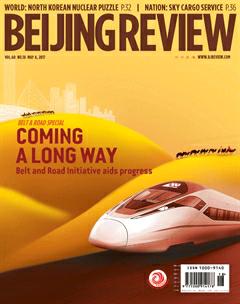Why the Spending Spree?
In the fi rst quarter, Chinas retail sales of con- sumer goods totaled 8.58 trillion yuan ($1.25 trillion), up by 10 percent over a year ago, according to the National Bureau of Statistics (NBS) on April 17. During this period, consumption contributed 77.2 percent to Chinas economic growth.
Days before the NBS figures were released, the UN World Tourism Organization(UNWTO) said in 2016, Chinas international tourism spending grew by 12 percent to$261 billion, consolidating Chinas position as the number one source market in the world since 2012 and continuing the trend of double-digit growth in tourism expenditure every year since 2004. Last year, Chinas international tourism spending was more than double that of the United States, which stood at $122 billion.
It is widely known that the United Stateseconomy is one of those best stimulated through spending. It has successfully recovered and now maintains sound growth, despite the negative impact of the global financial crisis in 2008, mainly because resumption of spending occurred first in the country. For quite a long period of time, outbound tourists from the United States spent more than those from any other nation.
Beyond any doubt, the fast growth of the number of the nations outbound travelers is a major reason for Chinas increased international tourism spending. Concerns about quality of products at home also encourage Chinas outbound tourists to spend more overseas.
It is undeniable that in terms of quality, some products sold in China are inferior to those sold in foreign markets, especially products made in countries with advanced manufacturing industries. In addition, the problem of counterfeit and shoddy goods is still serious in China, and protecting consumer rights is diffi cult.
Another reason many of Chinas consumers spend abroad is because foreign products enjoy more fame than Chinese products. Given a choice between similarly priced goods, some of which are well known compared with others, deciding what to buy is straightforward, especially for younger shoppers. And once they experience better products, many consumers in China continue to purchase the same foreign goods via the Internet, as e-commerce is now so well developed.
The influence on Chinas consumer markets of spending that follows on from buying sprees during international trips will grow stronger. If producers in China fail to establish reputable brands, they will find it increasingly difficult to compete in the international marketplace.
Increased spending by international travelers from China is not bad news by itself, but we must understand the underlying factors to be able to determine whether or not the magnitude of the increase lies within normal range.
Obviously, excessive increases deserve attention. The nation must work to establish its own high-end brands, which will improve the recognition and infl uence of China-made products and thereby, generate more profi t for domestic businesses.
“Made in China” should not solely be characterized by medium and low quality, and neither should Chinese producers merely churn out cheap goods for foreign consumers.
Furthermore, the government should work to improve the market environment and combat fake and shoddy products in order to enhance the trust of Chinas consumers in local products.

